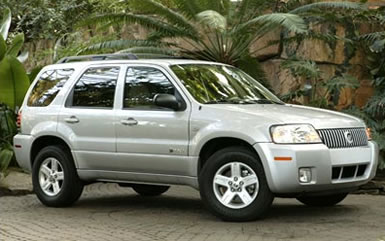
San Francisco: The
Mercury Mariner Hybrid looks almost exactly like the normal Mariner but
is more environmentally friendly. The only noticeable difference is a
Hybrid badge on the sides and rear of the SUV. Inside, unique gauges and
an LCD screen set the hybrid Mariner apart from its gasoline-only
counterpart. They feel very similar from the driver's seat, which is a
good thing.
If you’ve noticed
environmentalists have gotten a little more timid when they gripe about
SUVs, this might be the reason why. Sport utility vehicles, long
criticized for their gluttonous appetite for gas and dirty emissions,
are turning greener thanks to hybrid technology. Among these
Earth-friendly SUVs is a new hybrid version of the 2007 Mercury Mariner,
which offers better fuel economy and cleaner emissions with virtually no
drawbacks.
Just like the
groundbreaking Toyota Prius and Honda Civic Hybrid cars, the Mariner
Hybrid uses a small, four-cylinder engine in conjunction with an
electric motor to deliver great gas mileage, low emissions and decent
performance. It accelerates similar to the V6 Mariner, but it gets about
33 miles per gallon on the highway compared to the V6's 24 mpg.
Indeed, the differences
between the hybrid Mariner and its conventional counterpart are subtle.
From the outside, the only way you can tell the hybrid apart from any
other Mariner is by looking for a few special badges and a small air
vent, and even from the driver's seat it's easy to forget you're driving
a hybrid because it feels so similar to the regular SUV.
The biggest difference
is the transmission. Whereas most Mariners have a run-of-the-mill
automatic transmission, the hybrid version uses a continuously variable
transmission that never shifts. It constantly adjusts to find the
perfect combination of performance and economy.
Like all hybrids, it
uses big batteries and a powerful electric motor to supplement a
relatively small gas-powered engine. The batteries recharge every time
the vehicle brakes, so it never has to be plugged in.
In addition, the gas
engine shuts down every time the vehicle stops to save more fuel and cut
down on emissions. As soon as you lift your foot off the brake, it
starts right back up.
The Mariner's hybrid
system doesn't feel quite as refined as either the Prius or Civic
Hybrid. It's difficult to tell when the engine starts and stops in both
those cars because they run so smoothly and have been engineered to
start up so effortlessly. In the Mariner Hybrid, though, the engine
rumbles and shakes a little when it starts back up, making the start and
stop of the engine quite obvious at each red light.
Inside, the Mariner's
gauges aren't quite as polished and flashy as either the Prius or Civic
Hybrid. It has a small LCD screen on the dash, probably the smallest one
available in a car today, that doubles as an efficiency gauge and a
navigation system.
Other than having much
better gas mileage and a different transmission, the hybrid Mariner is
virtually identical to the standard version. That means it has a
comfortable interior, decent cargo capacity and a smooth ride, all
factors that have made the Mariner and its Ford cousin, the Escape, a
hot seller.
The biggest
disappointment is that the hybrid technology is not available on
lower-end equipment packages. While a traditional Mariner starts at
$22,870, the hybrid model is $27,895. Compared to the base Mariner, that
kind of a price premium quickly eats up any money you could save at the
pump.
What was tested?
The 2007 Mercury Mariner Hybrid Four-wheel Drive with a base price of
$27,895. Options: Premium package ($3,795), power moon roof ($585).
Price as tested including a $615 delivery charge: $32,275.
Why buy it? It
has everything that makes the Mercury Mariner a good SUV - comfort,
maneuverability and versatility - along with eco-friendly hybrid
technology.
Why avoid it? It
costs several thousand dollars more than a regular, non-hybrid Mariner,
so it's not likely to save much money on gas unless oil prices
skyrocket. On the other hand, $5,025 is a small price to pay for feeling
good about taking care of the environment. By
Derek Price © AutoWire.Net - San Francisco

Mercury Home Page
Byline: Syndicated
content provided by Tony Leopardo ©AutoWire.Net
Column Name: Mariner Hybrid marks a sea change in SUV efficiency
Topic: The 2007 Mercury Mariner Hybrid
Word Count: 760
Photo Caption: The 2007
Mercury Mariner Hybrid
Photo Credits: Mercury Internet Media
Series #: 2006 - 42
Download
the Microsoft Word version here:
2007 Mercury Mariner
Hybrid
Download the Original Image File here:
2007 Mercury Mariner Hybrid


|
